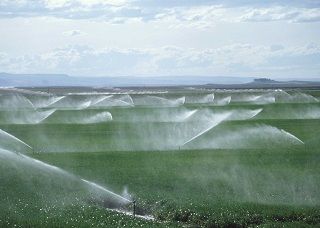Dealing with California’s Drought Requires Existing Solutions, Common Sense, and a Cessation of Political In-fighting
I´m traveling to California´s Central Valley soon for a story on the drought there. I would very much like to hear from anyone who´s seriously affected by the drought, perhaps especially farmers who might now have to change the way they use water. Also, I´d love to hear from anyone who is working on technological solutions to fight the ongoing drought. Who is going to save California?
The problem is this: there is a broad and extremely well-known set of technological solutions that is needed to address the water situation, but they are largely ignored/suppressed by vast moneyed interests. Btw, in most cases, these solutions will simultaneously reduce all the other myriad forms of environmental degradation that is occurring as a result of burning fossil fuels.
First of all, we need water conservation, and here in California, that needs to apply to agriculture. I bring this up because astonishingly, the governor’s plan to conserve water applies to everything but ag, which accounts for 80% of our total water use. His solution is like treating a cancer patient with lipstick. We need to phase out all water-intensive agriculture, and get rid of all such ag that is annually planted and not critically important to the state, e.g., alfalfa. This also means re-negotiating the water rights that enable certain parties in the desert to use obscene amounts of water, merely as a result of a deal they cut 100 years ago. News flash: the needs of the population of California, partially as a result of the climate scene, has changed significantly in the last century.
Outside of ag, there are many well-known and proven water-conservation products that address multi-family dwellings. A good example is linked above. How about mandates or incentives here?
Success here also means using a variety of other energy efficiency solutions that, in concert, lower the carbon footprint of our buildings. California has aggressive strategies in place here, but they need to be streamlined and less bureaucratic.
Incentives to develop alternate fuel vehicles that have no chance for commercial success are merely a waste of resources and a diversion from what really needs to happen: electrify transportation and remove coal entirely from our grid-mix.
Success means clean energy: solar, wind, and the support of advanced nuclear. Each of these are political footballs of enormous proportion, including, but not limited to the hyper-environmentalists who don’t want to see solar PV in the deserts because it reduces certain habitats. News flash #2: the survival of our animal species is under far greater threat from anthropogenic global warming than it is from the implementation of PV.
There are no secrets here. There are, however, a great number of political interests who want to see this fail, or, at best, want their own personal solution to succeed at the expense of others.
I’m available to you to carry on at great length on this; I could start talking this afternoon on the subject and not shut up until the middle of next week.

